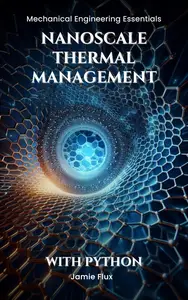
Free Download Nanoscale Thermal Management (Mechanical Engineering Essentials with Python) by Jamie Flux
English | September 10, 2024 | ISBN: N/A | ASIN: B0DGQ87DG1 | 405 pages | PDF | 1.48 Mb
This book offers a panoramic view of nanoscale thermal management, providing a robust foundation that covers both fundamental theories and contemporary research developments. From Fourier’s nano heat equation to quantum thermal reservoirs, each chapter is crafted to enrich your understanding with theoretical concepts, mathematical models, and practical simulations. With Python programming accompanying each topic, you’ll be poised to apply theoretical insights directly to analyses and solutions of complex thermal phenomena at the nanoscale.
Key Features:
– Delve into advanced topics of nanoscale thermal physics.
– Access practical Python code for each chapter to visualize and solve real-world nanoscale thermal problems.
– Gain insights into cutting-edge methodologies and their applications in the fields of nanotechnology and engineering.
– Navigate through a blend of quantum mechanics and classical thermodynamics tailored for nanoscale analysis.
What You Will Learn:
– Understand the adaptation of Fourier’s law to nanoscale systems.
– Explore quantum thermal conductance with Landauer’s formalism.
– Analyze Boltzmann Transport Equation for phonon transport predictions.
– Implement molecular dynamics simulations for heat transport analysis.
– Apply Nonequilibrium Green’s Function Method in nanoscale devices.
– Utilize Monte Carlo techniques for nanostructured materials.
– Model thermal management in quantum dots.
– Calculate thermal boundary resistance in nanoscale interfaces.
– Develop phonon hydrodynamic models.
– Simulate lattice dynamics for thermal management applications.
– Examine heat conduction in nanowires and 2D materials.
– Bridge atomic and continuum scales with mesoscale modeling.
– Predict phase changes with phase-field modeling.
– Interpret complex thermal behavior with effective medium approximations.
– Apply anisotropic heat transfer models to nanoscale materials.
– Experiment with non-Fourier heat conduction models.
– Utilize phononics and phononic crystals for thermal management.
– Solve nanoscale problems with spectral methods.
– Discover thermodynamic principles for nanoscale heat management.
– Explore ballistic heat transport and its thermal implications.
– Control coherent phonons in nanoscale devices.
– Conduct transient thermal analysis in nanostructures.
– Integrate multiscale modeling approaches for thermal management.
– Leverage Density Functional Theory in thermal predictions.
– Understand thermoelectric effects in nanostructures.
– Navigate statistical thermodynamics in nanoscale simulations.
– Model Kapitza resistance in interfacial heat transfer.
– Advance finite element analysis tailored to nanoscale challenges.
– Implement CFD methods for evaluating nanofluids.
– Study plasmonic heat generation in nanostructures.
– Explore quantum limits of thermal conductivity in nanomaterials.










Leave a Reply
You must be logged in to post a comment.